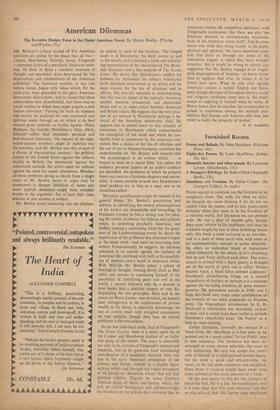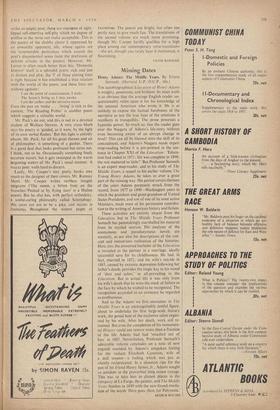Furnished Rooms
Domestic Interior and other poems. By Laurence Lerner. (Hutchinson, 15s.) Intentions and Versions. By Julian Cooper. (St. George's Gallery, 5s. each.)
POEMS (except in isolation) are the furniture of an imaginary room. The walls are what we infer, we 'imagine the room because if we do not we cannot value the poems; and we take poeins most seriously when they seem to be the furniture of a valuable world. For Davidson we can provide walls. He was a poet of notable gifts, though these were inferior to his ambitions; and since he is known largely by two or three anthology pieces only, this book inmost welcome'as an introduc- tion to a poet of some merit who, with some of his contemporaries, remains in undue obscurity. He offers an individual blend of ingredients mixed differently by the others; it isn't surprising that he and Yeats disliked each other. The poete maudit is crossed with a hero; poetry is brought out of the world of spirit and is called 'Matter become vocal, a blind force .without judgment.' Davidson's attitudinising brings on a certain insensitivity of rhythm; or perhaps it is a reaction against the wavering subtleties of some contem- poraries. He committed suicide in 1909, and I hope this book may make- some contribution to the revision of our stock judgnients on Nineties poets. The biographical introduction by R. D. MacLeod is informative but tiresomely archaic in tone, and it would have been useful to include Davidson's remarkable essay 'On Poetry' as a help to room-making.
Unlike Davidson, avowedly the servant' of a blind. force, Mr. MacNeice is a free poet, as he pointed out in a poem called 'To the Public' (not in this selection). The furniture has been re- arranged on some elusive principle; the room is very substantial. We may not 'accept this poet's view of himself as i thick-skinned lawless figure; but his mind is quick and unpredictable, his verses, in the old sense, numerous and delightful. More from rqtations would have made even more substantial this locus anu-enus of a book.
Of the new poetry in this list Mr. Lerner's is much the best. He is a late Movement poet, and it is now clear that The Less Deceived was the ne plus ultra of that. Mr. Lerner does sometimes
strike an empty pose, there are moments of tight- lipped self-assertive self-pity which no degree of artifice in the verse can make acceptable. This is the poetry of the shabby clever I, oppressed by an unworthy opponent, life, whose agents are the innumerable particulars which assault the poet's discontented sense (note the profusion of definite articles in the poems). However, Mr. Lerner is often much better than this. 'Domestic Interior' itself is a splendid poem, rich and just in diction and plot; the 'I' of these closing lines is right because it has established a true relation with the world of the poem, and these lines are without egotism : I am the point of consciousness. 1 make The house's living as I stay awake.
lam the author and the intrusive moon.
Even the pun on 'make . . . living' is rich in the context. 'The Reading Public' is another poem which suggests a valuable world.
Mr. Pack's do not, and this is sad in a devoted student of Wallace Stevens. A very crass blurb says his poetry is 'guided, as it were, by the light of its own verbal flashes.' But this light is entirely absent. Mr. Pack, for all his great themes and air of philosopher, is something of a gusher. There is a good deal that looks profound but turns out, I think, not to be. Occasionally something finely accurate occurs, but it gets swamped in the warm jargoning waters of Mr. Pack's usual manner. A muzzy poet; walls hard to discern.
Lastly, Mr. Cooper's tiny pretty books owe much to the designer of their covers, Mr. Ramsay Short. Mr. Cooper writes verbless imagist epigrams ('The moon, a bitten fruit on the branches/ Pecked at by flying stars' is a Hulme poem). But he also has, with perfect orthodoxy, a world-curing philosophy called Scientology; this turns out not to he a joke, and occurs in footnotes throughout the sixteen pages of
Intentions. The poems are bright, but often too pertly easy to give much fun. The translations of the second volume are much more promising, though Mr. Cooper hardly qualifies for a high place among our contemporary verse-translators —the art, though you rarely hear it mentioned, is Flourishing.
FRANK KERN1ODE



































 Previous page
Previous page